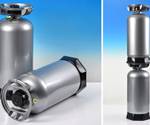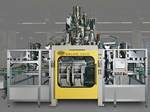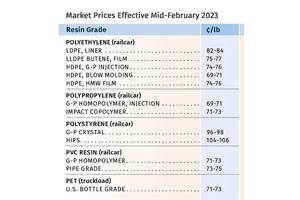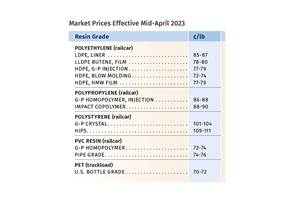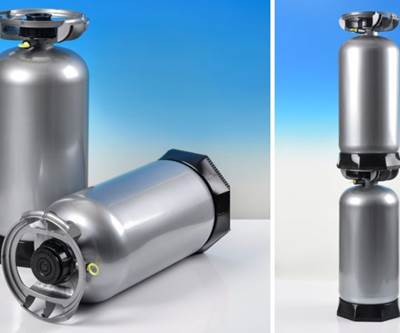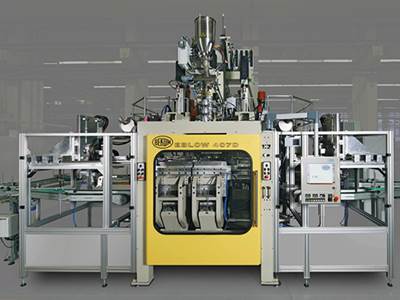Stretch-Blow 1000-Liter IBCs from PET
Cypet introduces a one-stage ISBM system to provide a clear alternative to HDPE bulk containers.
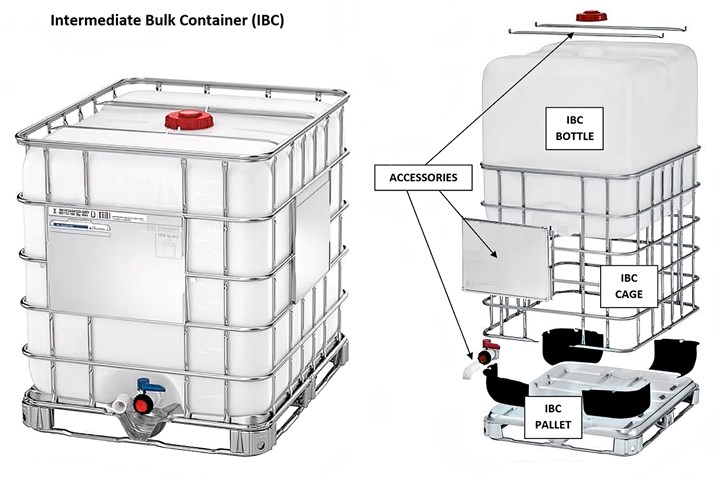
Conventional HDPE IBCs (shown here) can be replaced with glass-clear PET versions weighing about 35% less. (Photos: Cypet)
Cypet Technologies, a Cyprus-based producer of PET injection stretch-blow molding (ISBM) machines, has come out with its largest model yet, capable of making 1000-liter (264-gal) intermediate bulk containers (IBCs). Cypet is looking for a strategic partner to cooperate in commercializing PET IBCs globally.
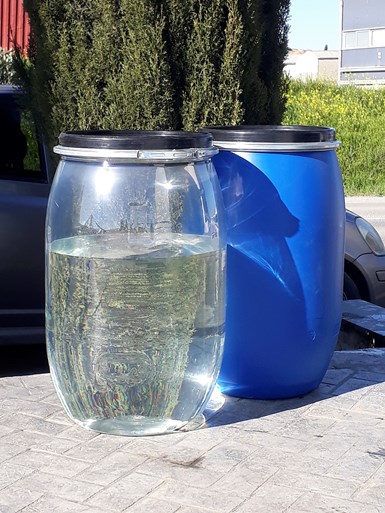
Until now, the largest container possible with Cypet’s ISBM technology was 120 L drums, shown here in PET and HDPE versions.
Up to now, the largest of Cypet’s single-stage ISBM machines could make up to 120 L PET containers with up to 400-mm necks. These machines are based on a horizontal injection molding machine platform with special tooling and automation. Servohydralic and all-electric models are available. Preform injection and stretch-blowing are accomplished in the same clamp with a special tooling package, in which the preform cavities are located below the blowing cavities. Preforms are molded in a horizontal orientation, while containers are blown in a vertical position. In a typical cycle, when the clamp opens, the preform cavities rotate from horizontal to vertical position, allowing an integrated top-entry linear robot to extract the preforms and transfer them to the blow molds while retaining their vertical orientation. The robot arm also extracts finished containers in the same operation. The clamp closes, and the containers are stretch-blown in the upper molds, while a new set of preforms are injection molded in the lower tooling. See a video of a Cypet machine in action at short.ptonline.com/cypet.
Cypet currently has two of its machines installed in the U.S., and two more are coming to plants in the U.S. and Mexico this year.
PET offers substantial weight savings, glass-clear product visibility, and recycling advantages over incumbent HDPE.
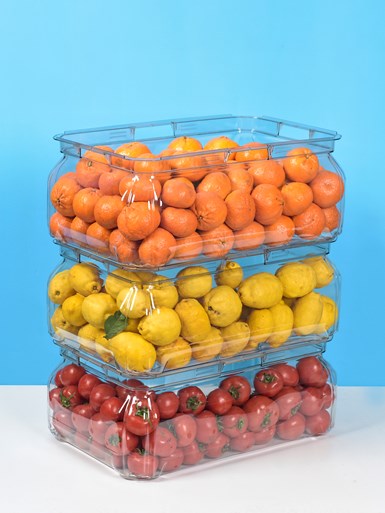
Cypet one-stage ISBM machines also can produce thee 55 L crates.
Cypet’s Michalis Sideris, in charge of business and technical development, says the new IBC machine is different in layout from the smaller models and utilizes upgraded technology, but declines to provide specific details for the present. He does reveal that the machine output will be about 30 IBCs/hr and the weight will be 8.5 to 9.5 kg (18.7 to 20.9 lb), vs. around 14 kg (30.8 lb) for HDPE. To that roughly 35% weight reduction, add the 40% higher density of PET than HDPE, and you get around 55% less plastic usage on a volumetric basis. Note also that the weight reduction contributes to lower energy expended for transporting the IBCs.
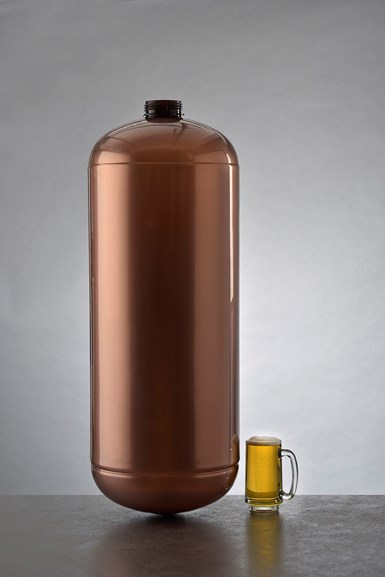
Another Cypet application is 50 L PET beer kegs.
Sideris notes two further advantages for PET over HDPE. One is glass clarity, providing visibility of the container’s contents. The other is enhanced recyclability. While both PET and HDPE are widely recycled, PET can be restored more easily to virgin quality, using heat treatment and solid-state polymerization (SSP) to restore I.V. loss (which correlates with molecular weight) during the first processing cycle. Recycling used PET IBCs directly into new IBCs (“bottle-to-bottle”) also has a technological head start over HDPE. These advantages make replacement of used PET IBCs with newly recycled containers more cost-effective than washing out used HDPE IBCs, especially for food-contact applications.
Cypet not only supplies machines, but also offers services for container design, structural simulation, preform design and development, and pilot production.
Related Content
First Quarter Looks Mostly Flat for Resin Prices
Temporary upward blips don't indicate any sustained movement in the near term.
Read MorePrices Flat-to-Down for All Volume Resins
This month’s resin pricing report includes PT’s quarterly check-in on select engineering resins, including nylon 6 and 66.
Read MoreCircular Network for Returnable Cosmetics and Personal Care Bottles
Stock reusable PET and glass bottles are provided to brands in Europe, along with consumer drop-off and collection points, labeling codes to identify bottles for reuse, cleaning technology, and recyclers to handle caps and pumps.
Read MorePP Prices May Plunge, Others Are Mostly Flat
PP prices appear on the verge a major downward trajectory, with some potential of a modest downward path for others.
Read MoreRead Next
Recyclable One-Way PET Keg
CYPET’s blow-molded keg addresses safety and cost issues of steel kegs.
Read MoreK 2013 Preview: Blow Molding
Of the six machine builders who were willing to pull back the curtain even a little, five of them said they’d be showcasing all-electric presses. That remarkable fact suggests that all-electric technology, which has been a much harder sell in blow molding than in injection molding, is at last starting to find traction.
Read MoreSee Recyclers Close the Loop on Trade Show Production Scrap at NPE2024
A collaboration between show organizer PLASTICS, recycler CPR and size reduction experts WEIMA and Conair recovered and recycled all production scrap at NPE2024.
Read More

